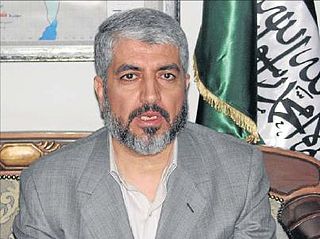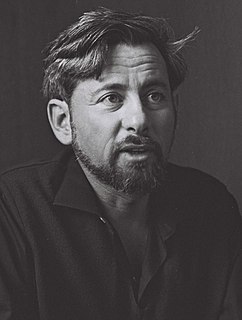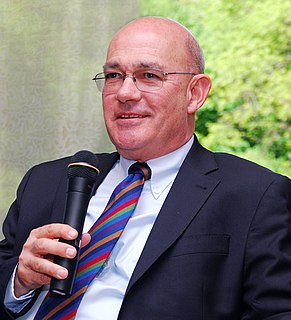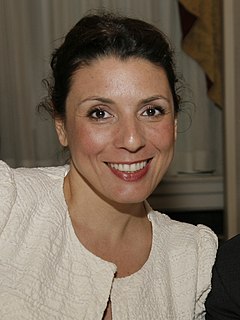A Quote by Geraldo Rivera
Perhaps areas of Israel where current large Palestinian populations and demographic realities exist could be exchanged for Israeli expansion into the West Bank to include most of East Jerusalem
Related Quotes
Unsettled Middle East, in these times where the people are trying to find their way towards democracy, could be interesting for many reasons - for weapons to be sold, for new geostrategic interests to be protected, and something that we are not talking about, which is the Israeli-Palestinian conflict. The people who are lost in the whole discussion here are the Palestinians. We have demonstrations in Palestine in West Bank. Nobody is covering this. It's as if they don't exist anymore. And this is, in fact, central. And Israel is silent.
Look, I am a Palestinian elected representative from Jericho. If a Palestinian wants to sell his fruit anywhere in the West Bank, he goes to the Israeli civil administration. If a Palestinian sick person wants to leave a hospital, he goes through the Israeli civil administration. Nobody can leave or enter my constituency without Israeli permission. Israel is, in effect, resuming the occupation.
The fact that there could be an ISIS West Bank, the fact that the Palestinian government in Gaza doesn't even acknowledge Israel's right to exist, the fact of constant terror, delegitimization campaigns in the Palestinian schools, these are all much bigger facts. And for the Barack Obama administration to focus on this one fact, almost, not to the expense, but to diminish some of the others which are much more important, is to cast all the blame on Israel and to take the U.N. policy toward Israel, which has been longstanding, and sort of surrender to it.
I've often made critical comments about settlement expansion in the occupied West Bank and in east Jerusalem, and my position hasn't changed. At the same time, it's equally important to me that the two sides, both Israel and the Palestinians, work towards a durable peace settlement: that's to say a viable two-state solution.
Since Israel would rather re-experience Masada than renounce the core Zionist objective of establishing a Jewish state, the only one-state "solution" on the horizon of realistic possibilities is an Israeli "one state" that fulfills the messianic nationalist ideal embraced by deep Zionism, likely consisting of completing the expansionist process of recent years by incorporating all or most of the West Bank, casting Gaza adrift, consolidating control over Jerusalem, and transferring as many West Bank Palestinians as possible to Jordan.
The solution is this: There will be a state of Palestine in all of the Occupied Territories of the West Bank and the Gaza Strip. The Green Line, the border that existed before 1967, will come into being again. Jerusalem will be the shared capital - East Jerusalem will be the capital of Palestine, West Jerusalem will be the capital of Israel. All settlements must be evacuated. The security must be arranged for both people, and there must be a moral solution and a practical solution.
If the corrupt Jordanian monarchy were overthrown, it would be the ideal opportunity to solve the Israeli-Palestinian conflict, because the West Bank and Jordan could then be united. There is already a Palestinian majority in Jordan, and there is enough room for everyone there. That would be the best revolution I could imagine.
When I visited Jerusalem and the West Bank back in 2008, I was shocked by how individual Palestinians and whole Palestinian communities were treated by the Israeli government. From the illegal settlements to daily humiliations at checkpoints, the evidence of gross injustice and the human suffering it brings is indisputable.
He is someone who is involved in the Israeli-Palestinian conflict in a fundamental way. Let's start with who Dani Dayan is. He was the former head of one of the main settler councils, the Yesha Council, which is a kind of umbrella organization for settlements in the occupied West Bank. Now, you know, for some countries this might not be an issue, but Brazil has made a point of its policies on the Israeli-Palestinian issue.
The U.S. position on Jerusalem was not the reason why there hasn't been progress towards peace. The reason is that both the Israeli government and the Palestinian leadership are divided. And there is an enormous gap between Israelis and Palestinians. To say that this decision is only recognizing reality, that Jerusalem is the actual capital of Israel - well, that's true. But it's a selective recognition of reality.
A peaceful resolution to the Israeli-Palestinian conflict will likely depend to a great extent on the economic development of a future Palestinian state. As I have argued before, private sector investment - especially in the West Bank - is going to prove crucial in creating the right political and social context for peace.
































